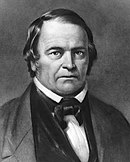 |
| William Miller |
In Revelation 14:9-11, John reports the announcement of an angel: "If anyone worships the beast and its image and receives a mark on his forehead or on his hand, he also will drink the wine of God’s wrath, poured full strength into the cup of His anger, and he will be tormented with fire and sulfur in the presence of the holy angels and in the presence of the Lamb. And the smoke of their torment goes up forever and ever, and they have no rest, day or night, these worshipers of the beast and its image, and whoever receives the mark of its name."
The angel describes several elements of this judgment which are relevant to this issue. First, the punishment will be in the presence of the faithful angels and Jesus Christ. That is, there are witnesses to the continuing punishment. If the wicked are merely annihilated, then what is there for Jesus and the angels to witness? Second, the smoke of their torment rises forever. In other words, the punishment does not have an end. Also, since it is torment, the wicked are conscious. They are not unconscious, as some liberals claim. What kind of demented Judge would Jesus be, if He remained to witness the punishment of an anesthetized prisoner? And third, and most importantly, the wicked have no rest. There is no relief, no cessation of their punishment. That one phrase itself is the opposite of what is asserted by the Millerites.
There is a question that isn't really related to this matter, but is, no doubt, coming to the mind of some who read this. How can it be just for there to be eternal punishment for the sins of a life of limited duration? While that is a common question, it is really asked without much consideration. First, the punishment of a crime is proportional, not only to the action, but also to the victim. For example, a man who kills his neighbor is not punished as severely as a man who kills the president. And, since all sin is an assault on the eternal, holy God, how can the punishment be limited to the nature of a mere man? Furthermore, the question is actually based on a circular presupposition, i. e., that the wicked in Hell ceases to be active, is asleep, or in some other way disconnected from what is happening. On the contrary, all social restrictions are removed, so all the wicked in Hell are free to proclaim their hatred of God without ceasing, and in the vilest language known to created beings. Therefore, the wicked continue to sin, and, thus, to earn judgment.




No comments:
Post a Comment